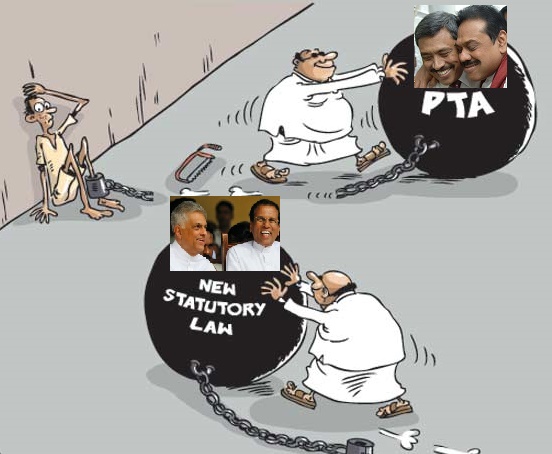Provisions of the Prevention of Terrorism Act (PTA) are to be revisited, the Government informed the Office of the High Commissioner for Human Rights (OHCHR) in a comprehensive response to a report by OHCHR.
The response by Sri Lanka to the damning report has now been published by the UN Human Rights Council following objections raised by Sri Lanka.
Sri Lanka had written to the UN Human Rights Council demanding that the full response be published online.
Accordingly, in the response published by the UN, the government noted that the Counter Terrorism Bill was not pursued with, and withdrawn, having had due regard to the views expressed by Parliamentarians including the Sectoral Oversight Committee on International Relations of the Parliament, religious leaders, trade unions, student organizations, civil society groups and public organizations that such legislation was unwarranted at this point of time.
The government, however, said it is intent on revisiting the provisions of the PTA having due regard to the progress made in the area of development and reconciliation. In that process the government said it will draw in aid international best practices adopted by other jurisdictions and the recommendations that may be made by the CoI appointed with regard to the Easter Sunday attacks.
“It may also be noted that the Attorney General is also reviewing cases pending before the High Courts with a view to ensure the expeditious disposal of cases involving LTTE cadres in order to bring a meaningful end to the said cases,” the government said in its response.
Overall, Sri Lanka says the report by OHCHR is based on incorrect and/or unsubstantiated and extraneous sources/material, and contravenes the principles of universality, impartiality, objectivity and non-selectivity, as stipulated in the GA resolution 60/251 that created the UN Human Rights Council.
The Government rejected the High Commissioner’s proposal “to advance accountability options at the international level”, including, in particular, her proposal to take steps towards referring Sri Lanka to the International Criminal Court.
Sri Lanka regrets that that OHCHR has submitted itself to the preconceived, politicized and prejudicial agenda which certain elements have relentlessly pursued to trigger such disproportionate and unwarranted measures against Sri Lanka, and cautions that any options at the international level would tantamount to an unwarranted interference in the internal affairs of a sovereign State in contravention of the UN Charter.
The government reminded OHCHR that calling for targeted sanctions and travel bans against individuals, in the absence of credible findings by a competent court/body on violations committed them, itself constitutes nothing less than a political agenda against a sovereign nation, aimed at destabilizing and a violation of their rights and contravention of the principles of natural justice.
Similarly, the government condemned the recommendation in the report to the UN to keep Sri Lanka’s peacekeeping operations under review.


